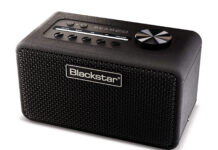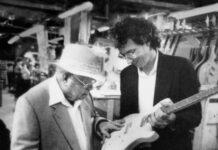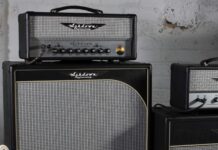
The Beths Pick Their Five Most Honest Guitar Records Of All Time
It takes effort to sound alive – the kind of sweat-broiled effort that’s laced throughout the Beths’ new record, Straight Line Was a Lie. Here, in the New Zealand band’s latest collection of seemingly weightless, effortless power-pop jams, you will find bare-bones honesty, both sonically and thematically, driven by real grit, graft, and intent.
READ MORE: Meet Boko Yout: Sweden’s most interesting new band who approach guitar chaos with the mindset of a cinematographer
While writing, guitarist-vocalist Liz Stokes pulled apart her process in the face of anxiety, medication and chronic illness, delving into life experiences that had previously been balanced on a shelf by turning to mechanical processes, whether that was clacking out pages on a typewriter, reading books on the craft, or boarding a flight from Auckland to Los Angeles in search of synapse-firing stimulation.
“It was really useful to be making something,” she says. “When I was struggling to make music, it was nice to be pulling something out of my brain and putting stuff in: books and movies and shows to feed the machine. Maybe you can’t get it to spit out what you want it to spit out, but you can hopefully spit out something else.”
Straight Line Was a Lie is home to songs that turn over living in a body that’s out to stymie you – Stokes discovered that she had Graves’ disease, an autoimmune condition that leads to hyperthyroidism – alongside reflections upon the complexity of her relationship with her mother and analysis of the way she navigates the world in comparison to the way she’d actually like to do it.
Every step of the way, these knotty, heavy emotional beats are carried by the sort of daring melodic work that has made the Beths such a unique proposition in indie-rock. But, more so than in the past, there’s also a keen appreciation for woody textures and a spotlight that’s always seeking out moments of chemistry and camaraderie.
Image: Press
While much of the record was made at guitarist-producer Jonathan Pearce’s studio in central Auckland, the band also decamped to the “winterless north” of New Zealand for a retreat that sounds pastoral and restorative. They surfed and hung out. “It was a real cheat code,” Pearce says. “I think getting everyone out of the city and making a record full time, it kind of gives you your twenties back.”
Stokes’ push for candour found a reflective surface in Pearce’s desire to stage a record that felt similarly documentarian. It isn’t an accident that you can hear the air moving as Tristan Deck’s kick drum sparks No Joy – a song about becoming washed out by antidepressants – into life, while Roundabout’s jangle feels like it’s only getting to you after it’s done a lap of the place. “Without wanting to get too intense about it, I do have the belief that these days you have to really work to put the space and the human beings in the recording,” he says.
“Music libraries, let alone AI, are getting so good. If you can’t hear people shuffling around in the room, the specific room that the performance is happening in, then it could be anything. “It could be anywhere. On previous albums, we’ve pursued that power-pop sensation that the music is happening right at the very front of the speaker. There’s nothing behind it, it’s right there in front of you. This one, it felt like there was lots more space. We really went looking for it.”
A core element of the record’s make up is Stokes’ Martin 00-15M, one of two “fancy new guitars” that became go-tos while in the studio, reflecting a greater interest in pensive pieces that play like the title track from 2020’s Jump Rope Gazers with the dream-pop dialled down in favour of something more plainly spoken. “I had always hated playing acoustic guitar because it was really hard,” she says with a laugh. “You have to be very clean and you can hear your fingers, which is a pro and a con, right? You can really hear the humanity in it.”
Image: Frances Carter
The other fancy new guitar was made for Stokes by Elliott Trent, the Poole-based luthier who’s also assembled instruments for Wet Leg’s Hester Chambers and California folkie Madison Cunningham. He contacted Stokes through the Beths’ Discord and was, initially, filed away as probable spam. “No one’s out here offering free guitars,” Stokes says. “That’s crazy. But Jon was like, ‘I think you should talk to him, he’s trying to help us.’”
Stokes eventually went with Trent’s M2 model, which arrived with two sets of pickups – mini humbuckers and hand-wound P90s. The original plan was to run with one of each, mirroring the G&L Fallout that had underpinned earlier Beths records, but both humbuckers are still in place. “They just sounded so good,” she says. “He makes all the hardware,” Pearce adds. “He’s not just finishing a body and sticking parts on it. He’s doing beautiful work.”
Pearce’s ‘78 Goldtop Les Paul Deluxe, meanwhile, continues to be foundational to his sound, which, as always, veers from nimble leads to sparky, fuzz-corrupted soloing. “It just shits on other guitars,” he says. “But I did get a Burns Double Six, a ‘60s one, and it slays. It’s got the Tri-Sonic pickups. It was in really rough shape, covered in mould and with a hugely bent neck. The guy who sold it to me said, ‘I think my brother played it in his punk band in the 1980s.’ That is a ridiculous story, right? What kind of punk band plays a 12 string from the 1960s? That is a band that I wish I could hear.”
The task of bringing it back from the brink fell to David Parker, whom Pearce describes as “the genius who sets up all our guitars here in New Zealand.” Parker had to get creative given the state of the Double Six and some of the more esoteric aspects of its engineering, including making his own key to adjust a truss rod that had been assumed to be pushing up daisies. “I completely stripped it down, cleaned it, and then I sent it to David,” Pearce continues. “Somehow, the truss rod was still working, it was just all the way backed off. He could straighten the neck over time. He made a new bridge for it, and it’s awesome. It’s all over Metal and Till My Heart Stops and has inspired a lot of parts.”
Next up, in the spirit of keeping things transparent, Stokes picks five records that speak to her as being particularly honest. They come from her peers in New Zealand’s indie scene and generational writers who have shaped the tastes of millions of listeners, but she was struck by one detail in making her selections. “I feel like in trying to assess other people for their authenticity or something, it makes you look for a brain that’s similar to yours,” she says. “I’ve been like, ‘Well, maybe when people are singing about being happy, they are just lying because obviously everybody is a ball of anxiety.’ I just can’t relate to that.”
The Goon Sax – We’re Not Talking (2018)
“I guess you can hear that the songwriting feels very earnest, and it’s extremely early twenties. It’s like being inside the brain of somebody that age. I feel like I thought half those thoughts and felt all those feelings. Hearing them stated so plainly, that would be a really scary thing to do. It feels like a very brave album to put out there.”
Pickle Darling – Bigness (2019)
“They’re an artist from New Zealand. All of their albums are great but Bigness is the first one I heard from them. It has extremely bedroomy, home recording vibes. It’s very lo-fi but I find Lukas [Mayo] always plays really interesting little guitar parts – the melodies really flow over each other in a way that I find really addictive. The lyrics feel a little bit stream of consciousness and the way that they string ideas together is a little bit collagey, I think. All these little thoughts feel very real, and they feel very unstudied because of that.”
Hans Pucket – No Drama (2022)
“This is a friend’s band from New Zealand. Oliver Devlin is the main songwriter. I fell in love with their first EP Jalapeño when I heard it on Bandcamp, and I was like, ‘Who is this? They’re from Wellington? Dammit!’ I’ve put down No Drama, which is their most recent album. They have a song called Kiss The Moon, which I’ve talked to Ollie about. I think it’s very brave to write about domesticity, that’s something that feels very honest. And because it’s more specific and less generic, it hits home very closely. It’s like being inside of a relationship in a very real way.”
Rilo Kiley – The Execution of All Things (2002)
“Jenny Lewis is one of my all time favourite songwriters and musicians. She’s been so influential on an entire generation of millennial women, and younger. The best example on that album is A Better Son/Daughter, which I think is this iconic song. It’s so raw, and it’s extremely honest. Anything that is dealing with the relationship with your parents feels like hallowed ground. We saw them play at Just Like Heaven and I was bawling the entire time. Hearing everybody screaming, ‘Sometimes when you’re on, you’re really fucking on,’ was really great.”
Tiny Ruins – Ceremony (2023)
“It’s a beautiful record all the way through. It’s a slow burn. You keep coming back to it because there’s something about it – the feeling of it just pulls you in. It’s quite a quiet record. Hollie [Fullbrook] has a real way with words and melodies. It can feel cryptic, or like it says not a lot, but it creates a whole world. There’s a lyric that I really like from a song called Earthly Things. The line is just, ‘The weather’s been so wild this week.’ It’s a thing that you would say, put in a really beautiful song.”
The Beths’ Straight Line Was A Lie is out on August 29 through Anti-.
The post The Beths Pick Their Five Most Honest Guitar Records Of All Time appeared first on Guitar.com | All Things Guitar.
Source: www.guitar-bass.net












